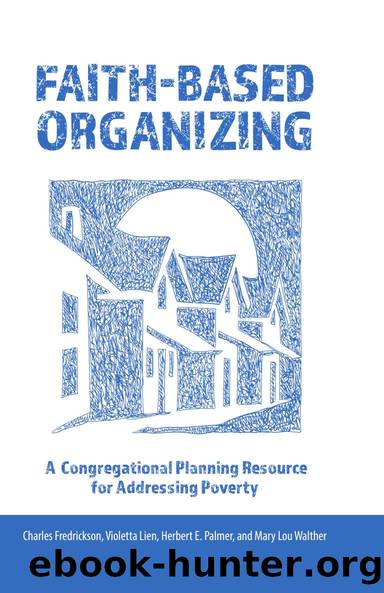Faith-Based Organizing by unknow

Author:unknow
Language: eng
Format: epub
ISBN: 9781506470153
Barnesnoble:
Publisher: 1517 Media
Published: 2021-05-04T00:00:00+00:00
7
Racism
Introduction
Scripture boldly proclaims, âSee what love the Father has given us, that we should be called children of God; and that is what we areâ (1 John 3:1). Love comes from and unites us to God. Consequently, we are all children of God. This goes beyond our divisions and makes us one. God calls us to share the gift of love with all in the world. What was initially a reminder to Godâs people long ago remains relevant for our time: âTake good care to observe the commandment and instruction that Moses the servant of the Lord commanded you, to love the Lord your God, to walk in all his ways, to keep his commandments, and to hold fast to him, and to serve him with all your heart and with all your soulâ (Josh 22:5).
This ancient reminder echoes Jesusâs summary of the law: âYou shall Love the Lord your God with all your heart, and with all your soul, and with all your strength, and with all your mind; and your neighbor as yourselfâ (Luke 10:27). Saint Paul reiterates, ââLove your neighbor as yourself.â Love does no wrong to a neighbor; therefore, love is the fulfilling of the lawâ (Rom 13:9â10). So who is our neighbor? Are we to love people of different races or ethnicities as we love ourselves?
Every comment, every joke, and every disparaging look in reaction to a personâs skin color, ethnicity, or place of origin is an expression of racism and a failure to acknowledge another human being as a sibling created in the image of God. Racism ignores the reality that all human beings share a common origin. All people are siblings, equally made in the image of God. Without such acknowledgment, the result is prejudice, fear, and often hatred of the other. Racism persists in churches, neighborhoods, nations, and the world.
The Evangelical Lutheran Church in America (ELCA) social statement âFreed in Christ: Race, Ethnicity and Cultureâ is clear: âRacismâa mix of power, privilege, and prejudiceâis sin, a violation of Godâs intention for humanity. The resulting racial, ethnic, or cultural barriers deny the truth that all people are Godâs creatures and therefore, persons of dignity. Racism fractures and fragments both church and society.â The statement continues, âRacism, both blatant and subtle, continues to deny the reconciling work of the cross. Godâs forgiveness frees us from the enslavement of racism. For some this may mean giving up power or privilege: for others, it may mean giving up anger or prejudice. Let us know this reconciliation in our lives.â1
Because racism leads to inequalities, it is a direct cause of poverty that explains why some people endure unequal treatment or status. If society is to address poverty, it must deal with racism, a major component of community power structures. Understanding the relationship between racism and power in a community is critical for resolving poverty issues.
Undoing racism is key to unlocking the door to forms and patterns of poverty that emerged during the early history of the United States and remain intact today.
Download
This site does not store any files on its server. We only index and link to content provided by other sites. Please contact the content providers to delete copyright contents if any and email us, we'll remove relevant links or contents immediately.
Fangirl by Rainbow Rowell(9226)
How to Bang a Billionaire by Alexis Hall(8143)
Wonder by R. J. Palacio(8097)
The Space Between by Michelle L. Teichman(6927)
The Thirst by Nesbo Jo(6921)
Assassin’s Fate by Robin Hobb(6194)
Wiseguy by Nicholas Pileggi(5765)
The Night Circus by Erin Morgenstern(5214)
Paper Towns by Green John(5174)
The Kite Runner by Khaled Hosseini(5162)
Bittersweet (True North #1) by Sarina Bowen(4842)
Gerald's Game by Stephen King(4636)
Too Much and Not the Mood by Durga Chew-Bose(4333)
Pillow Thoughts by Courtney Peppernell(4271)
Goodbye Paradise(3795)
Twelve Days of Christmas by Debbie Macomber(3551)
Good by S. Walden(3543)
The Rosie Effect by Graeme Simsion(3457)
The Cellar by Natasha Preston(3332)
